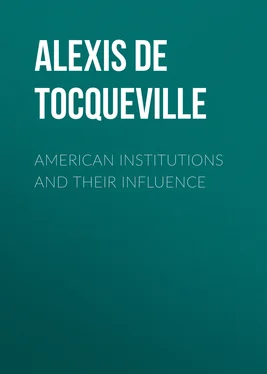Alexis de Tocqueville - American Institutions and Their Influence
Здесь есть возможность читать онлайн «Alexis de Tocqueville - American Institutions and Their Influence» — ознакомительный отрывок электронной книги совершенно бесплатно, а после прочтения отрывка купить полную версию. В некоторых случаях можно слушать аудио, скачать через торрент в формате fb2 и присутствует краткое содержание. Жанр: foreign_antique, Политика, foreign_edu, на английском языке. Описание произведения, (предисловие) а так же отзывы посетителей доступны на портале библиотеки ЛибКат.
- Название:American Institutions and Their Influence
- Автор:
- Жанр:
- Год:неизвестен
- ISBN:нет данных
- Рейтинг книги:5 / 5. Голосов: 1
-
Избранное:Добавить в избранное
- Отзывы:
-
Ваша оценка:
- 100
- 1
- 2
- 3
- 4
- 5
American Institutions and Their Influence: краткое содержание, описание и аннотация
Предлагаем к чтению аннотацию, описание, краткое содержание или предисловие (зависит от того, что написал сам автор книги «American Institutions and Their Influence»). Если вы не нашли необходимую информацию о книге — напишите в комментариях, мы постараемся отыскать её.
American Institutions and Their Influence — читать онлайн ознакомительный отрывок
Ниже представлен текст книги, разбитый по страницам. Система сохранения места последней прочитанной страницы, позволяет с удобством читать онлайн бесплатно книгу «American Institutions and Their Influence», без необходимости каждый раз заново искать на чём Вы остановились. Поставьте закладку, и сможете в любой момент перейти на страницу, на которой закончили чтение.
Интервал:
Закладка:
If we examine what has happened in France at intervals of fifty years, beginning with the eleventh century, we shall invariably perceive that a twofold revolution has taken place in the state of society. The noble has gone down on the social ladder, and the roturier has gone up; the one descends as the other rises. Every half-century brings them nearer to each other, and they will very shortly meet.
Nor is this phenomenon at all peculiar to France. Whithersoever we turn our eyes, we shall discover the same continual revolution throughout the whole of Christendom.
The various occurrences of national existence have everywhere turned to the advantage of democracy; all men have aided it by their exertions; those who have intentionally labored in its cause, and those who have served it unwittingly—those who have fought for it, and those who have declared themselves its opponents—have all been driven along in the same track, have all labored to one end, some ignorantly, and some unwillingly; all have been blind instruments in the hands of God.
The gradual development of the equality of conditions is, therefore, a providential fact, and it possesses all the characteristics of a divine decree: it is universal, it is durable, it constantly eludes all human interference, and all events as well as all men contribute to its progress.
Would it, then, be wise to imagine that a social impulse which dates from so far back, can be checked by the efforts of a generation? Is it credible that the democracy which has annihilated the feudal system, and vanquished kings, will respect the citizen and the capitalist? Will it stop now that it has grown so strong and its adversaries so weak?
None can say which way we are going, for all terms of comparison are wanting: the equality of conditions is more complete in the Christian, countries of the present day, than it has been at any time, or in any part of the world; so that the extent of what already exists prevents us from foreseeing what may be yet to come.
The whole book which is here offered to the public, has been written under the impression of a kind of religious dread, produced in the author's mind by the contemplation of so irresistible a revolution, which has advanced for centuries in spite of such amazing obstacles, and which is still proceeding in the midst of the ruins it has made.
It is not necessary that God himself should speak in order to disclose to us the unquestionable signs of his will; we can discern them in the habitual course of nature, and in the invariable tendency of events; I know, without a special revelation, that the planets move in the orbits traced by the Creator's fingers.
If the men of our time were led by attentive observation and by sincere reflection, to acknowledge that the gradual and progressive development of social equality is at once the past and future of their history, this solitary truth would confer the sacred character of a divine decree upon the change. To attempt to check democracy would be in that case to resist the will of God; and the nations would then be constrained to make the best of the social lot awarded to them by Providence.
The Christian nations of our age seem to me to present a most alarming spectacle; the impulse which is bearing them along is so strong that it cannot be stopped, but it is not yet so rapid that it cannot be guided: their fate is in their hands; yet a little while and it may be so no longer.
The first duty which is at this time imposed upon those who direct our affairs is to educate the democracy; to warm its faith, if that be possible; to purify its morals; to direct its energies; to substitute a knowledge of business for its inexperience, and an acquaintance with its true interests for its blind propensities; to adapt its government to time and place, and to modify it in compliance with the occurrences and the actors of the age.
A new science of politics is indispensable to a new world.
This, however, is what we think of least; launched in the middle of a rapid stream, we obstinately fix our eyes on the ruins which may still be descried upon the shore we have left, while the current sweeps us along, and drives us backward toward the gulf.
In no country in Europe has the great social revolution which I have been describing, made such rapid progress as in France; but it has always been borne on by chance. The heads of the state have never had any forethought for its exigences, and its victories have been obtained without their consent or without their knowledge. The most powerful, the most intelligent, and the most moral classes of the nation have never attempted to connect themselves with it in order to guide it. The people have consequently been abandoned to its wild propensities, and it has grown up like those outcasts who receive their education in the public streets, and who are unacquainted with aught but the vices and wretchedness of society. The existence of a democracy was seemingly unknown, when, on a sudden, it took possession of the supreme power. Everything was then submitted to its caprices; it was worshipped as the idol of strength; until, when it was enfeebled by its own excesses, the legislator conceived the rash project of annihilating its power, instead of instructing it and correcting its vices; no attempt was made to fit it to govern, but all were bent on excluding it from the government.
The consequence of this has been that the democratic revolution has been effected only in the material parts of society, without that concomitant change in laws, ideas, customs, and manners, which was necessary to render such a revolution beneficial. We have gotten a democracy, but without the conditions which lessen its vices, and render its natural advantages more prominent; and although we already perceive the evils it brings, we are ignorant of the benefits it may confer.
While the power of the crown, supported by the aristocracy, peaceably governed the nations of Europe, society possessed, in the midst of its wretchedness, several different advantages which can now scarcely be appreciated or conceived.
The power of a part of his subjects was an insurmountable barrier to the tyranny of the prince; and the monarch who felt the almost divine character which he enjoyed in the eyes of the multitude, derived a motive for the just use of his power from the respect which he inspired.
High as they were placed above the people, the nobles could not but take that calm and benevolent interest in its fate which the shepherd feels toward his flock; and without acknowledging the poor as their equals, they watched over the destiny of those whose welfare Providence had intrusted to their care.
The people, never having conceived the idea of a social condition different from its own, and entertaining no expectation of ever ranking with its chiefs, received benefits from them without discussing their rights. It grew attached to them when they were clement and just, but it submitted without resistance or servility to their exactions, as to the inevitable visitations of the arm of God. Custom, and the manners of the time, had moreover created a species of law in the midst of violence, and established certain limits to oppression.
As the noble never suspected that any one would attempt to deprive him of the privileges which he believed to be legitimate, and as the serf looked upon his own inferiority as a consequence of the immutable order of nature, it is easy to imagine that a mutual exchange of good-will took place between two classes so differently gifted by fate. Inequality and wretchedness were then to be found in society; but the souls of neither rank of men were degraded.
Men are not corrupted by the exercise of power or debased by the habit of obedience; but by the exercise of power which they believe to be illegal, and by obedience to a rule which they consider to be usurped and oppressive.
Читать дальшеИнтервал:
Закладка:
Похожие книги на «American Institutions and Their Influence»
Представляем Вашему вниманию похожие книги на «American Institutions and Their Influence» списком для выбора. Мы отобрали схожую по названию и смыслу литературу в надежде предоставить читателям больше вариантов отыскать новые, интересные, ещё непрочитанные произведения.
Обсуждение, отзывы о книге «American Institutions and Their Influence» и просто собственные мнения читателей. Оставьте ваши комментарии, напишите, что Вы думаете о произведении, его смысле или главных героях. Укажите что конкретно понравилось, а что нет, и почему Вы так считаете.












